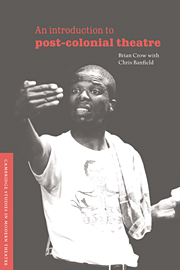Book contents
- Frontmatter
- Contents
- Preface
- Acknowledgements
- Introduction
- 1 Derek Walcott and a Caribbean theatre of revelation
- 2 August Wilson's theatre of the blues
- 3 Jack Davis and the drama of Aboriginal history
- 4 Wole Soyinka and the Nigerian theatre of ritual vision
- 5 Athol Fugard and the South African ‘workshop’ play
- 6 Badal Sircar's Third Theatre of Calcutta
- 7 Girish Karnad and an Indian theatre of roots
- Conclusion
- Further reading list
- Index
3 - Jack Davis and the drama of Aboriginal history
Published online by Cambridge University Press: 26 February 2010
- Frontmatter
- Contents
- Preface
- Acknowledgements
- Introduction
- 1 Derek Walcott and a Caribbean theatre of revelation
- 2 August Wilson's theatre of the blues
- 3 Jack Davis and the drama of Aboriginal history
- 4 Wole Soyinka and the Nigerian theatre of ritual vision
- 5 Athol Fugard and the South African ‘workshop’ play
- 6 Badal Sircar's Third Theatre of Calcutta
- 7 Girish Karnad and an Indian theatre of roots
- Conclusion
- Further reading list
- Index
Summary
As an invader/settler society, white Australia's artistic culture has been deeply influenced by its particular experience of colonization. Where the theatre is concerned, this has meant the domination of its mainstream and ‘art’ theatres by foreign products and models (mainly British) until well into this century. It was only in the late 1960s and seventies that distinctively Australian voices began to sound in its theatres, at first in the more experimental ‘fringe’ venues, interrogating, satirically commentating on, but at the same time asserting a specifically Australian national identity. While hit musicals and ‘serious’ plays that have had critical and usually commercial success in the West End or on Broadway continue to appeal to Australian audiences, the last three decades have witnessed the flourishing of a genuinely indigenous dramatic culture (in film as much if not more than in the theatre) that has increasingly reflected and explored the growing multiculturalism of Australia itself.
One of the main preoccupations of all this dramatic activity has been the recuperation and reappraisal of Australian history. Katharine Brisbane, in the introduction to her anthology of recent Australian drama, justly observes that ‘[t]he past in the present, the past bearing down upon the present, is probably the most consistent theme in contemporary Australian drama’. While such a large and central theme inevitably has numerous facets, at the centre of Australian historical consciousness lie the twin traumas accompanying the birth of what was to be the nation: Australia's original function as a penal colony for Britain, and the devastating impact of white invasion and settlement on the native Aborigines.
- Type
- Chapter
- Information
- An Introduction to Post-Colonial Theatre , pp. 61 - 77Publisher: Cambridge University PressPrint publication year: 1996

